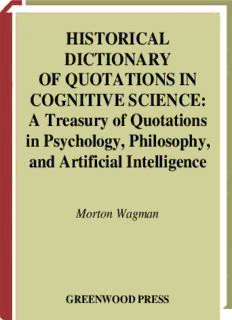Table Of ContentHISTORICAL
DICTIONARY
OF QUOTATIONS IN
COGNITIVE SCIENCE:
A Treasury of Quotations
in Psychology, Philosophy,
and Artificial Intelligence
Morton Wagman
GREENWOOD PRESS
HISTORICAL DICTIONARY
OF QUOTATIONS IN
COGNITIVE SCIENCE
HISTORICAL DICTIONARY
OF QUOTATIONS IN
COGNITIVE SCIENCE
A Treasury of Quotations in
Psychology, Philosophy, and
Artificial Intelligence
Compiled by Morton Wagman
Greenwood Press
Westport, Connecticut • London
LibraryofCongressCataloging-in-PublicationData
Historicaldictionaryofquotationsincognitivescience : atreasuryofquotationsin
psychology,philosophy,andartificialintelligence / [compiledby]MortonWagman.
p. cm.
Includesbibliographicalreferencesandindex.
ISBN0–313–31284–2(alk.paper)
1. Cognitivescience—Quotations,maxims,etc. 2. Artificialintelligence—Quotations,
maxims,etc. 3. Psychology—Quotations,maxims,etc. 4. Philosophy—Quotations,
maxims,etc. I. Wagman,Morton.
PN6084.C545 H57 2000
153—dc21 99–043404
BritishLibraryCataloguinginPublicationDataisavailable.
Copyright(cid:1)2000byMortonWagman
Allrightsreserved.Noportionofthisbookmaybe
reproduced,byanyprocessortechnique,withoutthe
expresswrittenconsentofthepublisher.
LibraryofCongressCatalogCardNumber:99–043404
ISBN:0–313–31284–2
Firstpublishedin2000
GreenwoodPress,88PostRoadWest,Westport,CT06881
AnimprintofGreenwoodPublishingGroup,Inc.
www.greenwood.com
PrintedintheUnitedStatesofAmerica
TM
Thepaperusedinthisbookcomplieswiththe
PermanentPaperStandardissuedbytheNational
InformationStandardsOrganization(Z39.48–1984).
10 9 8 7 6 5 4 3 2 1
Contents
Preface vii
Acknowledgments xi
The Dictionary 1
Bibliography 241
Author Index 259
Subject Index 265
Preface
Therearemany booksofquotations.Thisvolumeisahighlyspecialized
one for the new areas of cognitive science that include psychology, phi-
losophy, and artificial intelligence. This is the only book of its type.
The quotations in this volume have been selected with regard to cri-
teria of special interest to scholars, professionals, and graduate students
inpsychology,philosophy,andartificialintelligence.Theselectionshave
met one or more of the following criteria: appealing to special interest;
beingwellexpressed,succinct,apt,pithy,clever,insightful,fundamental,
basic; summarizing;epitomizing;clearlystatingaposition;providingan
overview; illuminating a special topic; defining goals, presenting a his-
torical sketch of an area of research; reflecting divergent assumptionsof
scientists and scholars; contrasting methods and approaches; defining
limitations in a conceptual area of research and theory; and, most im-
portant, being centrally foundational to the field.
The categories into which the quotations are divided representnearly
two hundred aspects of thought, and the more than four hundred quo-
tations represent the product of the best thinking of scholars and scien-
tists within these categories, which have to do with the thinking that
psychology, philosophy, and artificial intelligence comprise. The quota-
tions are, of course, the manifest product of the scholars’ thought con-
cerning some aspects of a category of thinking.
Scholars, professionals, and graduate and advanced undergraduate
students in psychology, philosophy, artificial intelligence, and related
disciplines who are looking for the best thought in the form of an epit-
omizing quotation concerning a specific topic or subtopic in cognitive
science will find the book especially informative.
The book is organized by a categorized system of key phrases. In this
format, each category title is followed by a key phrase, for example,
viii PREFACE
Analogy The Mathematical View; or Artificial Intelligence Three
GoalsofArtificialIntelligence.Thekeyphrasesepitomizetheintellectual
contribution of the quotations they introduce, which span classical civi-
lizationthroughtheRenaissanceandtheEnlightenmenttoscientificmo-
dernity and the Information Age. The quotations, which vary in length
from 10 words to 300 words, are followed by citations that provide
source page numbers to enable the reader to locate the quotation and
ascertain its context.
Theorganizationofthecategories,thekeyphrases,andthequotations,
along with the author index, the subject index, and the bibliography, is
intended to facilitate use of this volume. Thus, the categories in the text
are arranged alphabetically, with each quotation appearing under a
heading consisting of the category title and the key phrase. Within each
category,quotationsarearrangedchronologically.Theauthorindexlists
alphabetically the names of the authors of the quotations andthenames
cited within quotations. The subject index, which lists dictionary entries
with page numbers in boldface, provides easy access to these category
titles and key phrases. Appropriate cross-references for this data are
cited.
Finally, the complete bibliography of the books from which the
quotations are drawn will prove to be a valuable resource to interested
readers.
Quality and recency of quotations are important selection criteria.
Thus, outstanding intellectual developments in traditional artificial in-
telligence as well as in more recent connectionist paradigms are well
represented.Thebestquotationsfromcurrenttheoriesinthephilosophy
of mind as well as influential quotations from venerable philosophical
thought are included. Many of the quotations reflect contemporary de-
velopmentsinlogic,language,andmathematicalthought.Cognitivepsy-
chology, including memory, learning, reasoning, and problem solving,
is well represented in many quotations. In short, this book is a treasury
of thinking about thinking, a compendium of distinguished quotations
in psychology, philosophy, artificial intelligence, and cognitive science.
HistoricalDictionaryofQuotationsinCognitiveScience:ATreasuryofQuo-
tationsinPsychology,Philosophy,andArtificialIntelligenceisthemostrecent
volumeinaseriesofpublishedandplannedvolumeswiththeconsistent
theme of developing intellectual grounding for establishing the theoret-
ical and research foundations and the psychological and philosophical
implications of a general unified theory of human and artificial intelli-
gence (Wagman, 1991a, 1991b, 1993, 1995, 1996, 1997a, 1997b, 1998a,
PREFACE ix
1998b, 1998c, 1999, 2000). Each of the volumes contributes importantas-
pects of this enterprise, and each reflects new theory, research, and
knowledge in both human and artificial intelligence across the domains
of problem solving, reasoning, analogical thinking, learning, memory,
linguistic processes, and scientific creativity.
Thevolumesaremutuallysupportive,andallaredirectedtothesame
audience: to scholars and professionals in psychology, artificial intelli-
gence, and cognitive science, and to graduate and advancedundergrad-
uate students in these and related disciplines.

